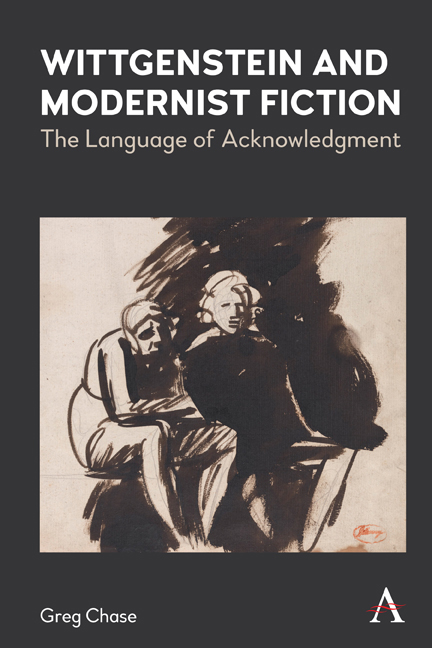Book contents
- Frontmatter
- Contents
- Acknowledgments
- List of Abbreviations
- Introduction: Modernist Philosophy and Modernist Fiction
- 1 “Who’s ‘We’?”: Claims to Community in Forster’s Howards End and Woolf ’s Mrs. Dalloway
- 2 “The Silent Soliloquy of Others”: Wittgenstein’s Pursuit of Acknowledgment
- 3 “To See with the Same Eyes”: Marriage and Same-Sex Intimacy in Ford, Woolf, and Larsen
- 4 Fragmenting Families, Private Language Fantasies: Faulkner’s The Sound and the Fury and As I Lay Dying
- 5 Seeing Humans as Humans: Wright’s Black Boy and Ellison’s Invisible Man
- Conclusion: Afterlives of Acknowledgment
- Notes
- Bibliography
- Index
5 - Seeing Humans as Humans: Wright’s Black Boy and Ellison’s Invisible Man
Published online by Cambridge University Press: 27 April 2022
- Frontmatter
- Contents
- Acknowledgments
- List of Abbreviations
- Introduction: Modernist Philosophy and Modernist Fiction
- 1 “Who’s ‘We’?”: Claims to Community in Forster’s Howards End and Woolf ’s Mrs. Dalloway
- 2 “The Silent Soliloquy of Others”: Wittgenstein’s Pursuit of Acknowledgment
- 3 “To See with the Same Eyes”: Marriage and Same-Sex Intimacy in Ford, Woolf, and Larsen
- 4 Fragmenting Families, Private Language Fantasies: Faulkner’s The Sound and the Fury and As I Lay Dying
- 5 Seeing Humans as Humans: Wright’s Black Boy and Ellison’s Invisible Man
- Conclusion: Afterlives of Acknowledgment
- Notes
- Bibliography
- Index
Summary
In his essay “Stranger in the Village” (1953), James Baldwin uses his experience in a remote Swiss village as a lens through which to examine American racial politics. He recalls the sense of “wonder” with which the villagers approach him, the first dark-skinned person they have ever encountered. Certainly, he writes, the villagers’ amazement carries with it “no suggestion that I was human.” Yet Baldwin also identifies “a dreadful abyss between the streets of this village and the streets of the city in which I was born, between the children who shout Neger! today and those who shouted Nigger! yesterday”—and, he continues, “the abyss is experience, the American experience.” The villagers’ simple ignorance is, Baldwin finds, markedly different from the repressed knowledge and blind rage that his presence induces in American Whites, for whom the question of how to conceive of people like him is as old as the nation itself.
Baldwin goes on to describe the stakes, as he understands them, of American racial conflict. White Americans, the actual or imagined descendants of those European emigrants who founded the nation, see themselves as “guardians and defenders” of “civilization.” As a result,
it was impossible for Americans to accept the black man as one of themselves, for to do so was to jeopardize their status as white men. But not so to accept him was to deny his human reality, his human weight and complexity, and the strain of denying the overwhelmingly undeniable forced Americans into rationalizations so fantastic that they approached the pathological.
The history of America is, Baldwin suggests, the history of this collective White refusal to admit Black humanity—an attitude he sees Whites defending all the more stubbornly once they perceive its indefensibility. Faulkner, the subject of the last chapter, has chronicled the “strain” of this mindset arguably as well as any White author in American literary history; indeed, it is a major impetus to the feelings of cultural displacement voiced by characters like Jason Compson and Anse Bundren.
Previous chapters have explored the historically specific ways different forms of social relation (including marriages and parent– child relationships) offer and foreclose what Cavell calls “acknowledgment”—a mode of compassionate responsiveness toward the inner lives of others that he identifies as crucial to Wittgenstein's later philosophy.
- Type
- Chapter
- Information
- Wittgenstein and Modernist FictionThe Language of Acknowledgment, pp. 149 - 180Publisher: Anthem PressPrint publication year: 2022



